How to Come Up With Story Ideas: 20+ Techniques to Try
The hardest thing about writing a story is coming up with a brilliant idea that will amaze and astonish readers around the world. And we’re not talking about those typical ‘boy meets girl’ or those ‘once upon a time there lived a boy’ kind of stories. We’re talking about stories that will take over your reader’s lives. That will have students analysing your characters in classrooms and have Hollywood directors fighting over it to make a movie of your idea. Oh, but all that sounds impossible. Does an idea like that even exist? Well… It’s not completely impossible that’s for sure! After all, you only need one brilliant story idea. One story idea that could possibly change the lives of millions and make you a legendary author. So, now all you need is that one brilliant idea and your set! Don’t worry we’re not going to leave you hanging there – This post contains over 20 techniques on how to come with story ideas that will amaze your readers! Just keep on reading and you’ll find that amazing story idea in no time.
- Freestyle Writing
- Keep a story writer’s idea journal
- The good ole’ story jar
- Story ideas generators
- Five Senses Technique
- 1 Fact and 3 Fiction rule
- Writing prompts
- Image Prompts
- Random words
- Magazines and newspapers
- TV shows
- Listen to some music
- Old Drawings
- Doodle around
- Speak to a family member
- Go to sleep
- Read a book
- Remember history
- Random objects
- Your interests
- Observe others
- Video Writing Prompts
- Set yourself goals
Freestyle Writing
Let your imagination run wild and go freestyle with your writing! This doesn’t mean you throw your pens and pencils around the room (although this could inspire you). Freestyle writing involves you, a piece of paper and a pen or pencil. Sounds simple enough! So here’s how you can do some freestyle writing. First, sit at a nice desk in a well-lit room. With a paper in front and pen in hand, start writing everything that comes to mind. Even if the only thing that springs to mind is, “I’m bored” or “I don’t know what I’m doing…”. Just write it down! After a few turns, you might find yourself getting inspired to carry on writing about something that happened in your day or an old memory that just popped into your head.
To make the most out of the freestyle writing technique we suggest using a timer. Set yourself between 5 to 15 minutes of freestyle writing every day. And soon that brilliant story idea may be coming your way!
Keep a story writer’s idea journal
There’s no mathematical formula for finding a winning story idea. Sometimes you just have to wait it out and then in the least expected place, an idea will pop into your head and you’ll be like “WOW! That’s actually quite cool!”. Moments like that can’t be ignored or forgotten about – You need to write them down somewhere! This is why every writer should keep an ideas journal. An ideas journal is a simple notebook with all your ideas for stories, characters, settings, dialogue etc. noted down. Every day the average person may come across hundreds of sources of inspiration. With our minds overloaded with information, we tend to forget about the little things that happen in a day. With an ideas journal, you can carry it around with your all day and every time something inspires you just write it down. Then when you’re sitting at your desk with a blank paper in front of you, you can just pull out your ideas journal for that much-needed inspiration.
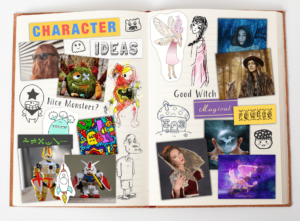
An ideas journal doesn’t just need to contain writing only. You can draw characters, doodle in it or even stick inspiration pictures and photographs inside it.
The good ole’ story jar
Jars are useful for many things, like keeping cookies in them, candy and even your pocket money. But have you ever thought about using a jar as a source of inspiration for your stories? Of course, an empty jar by itself won’t do much good. But filled with a bunch of ideas, words, sentences, phrases and whatever else could make a simple jar very inspiring. The way you use your story jar is up to you. But we like to hayamix.com cut out random words from magazines and use famous quotes, cut them into little strips so they can fit inside a jar. Then when you’re lost for inspiration just go to your story jar and pick out a random strip of paper. This one ripped piece of paper could have the brilliant idea you searched so long for.
You can also add writing prompts and story starters to your story jar. Or how about just filling your jar up with images cut-outs from magazines and newspapers – That could be pretty fun!
Story ideas generators
Is your brain getting too lazy to come up with story ideas? Not to worry, let technology do all the hard work. Story idea generators are normally online tools which automatically come up with story ideas by just clicking a couple of buttons. In fact, Imagine Forest has a really great story idea generator that can generate a wacky story idea in a matter of seconds. This story idea may not be your winning idea, but it’s a great start and a brilliant source of inspiration when you’re bored:
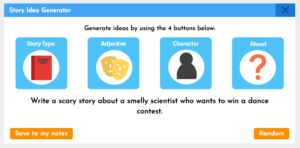
The Imagine Forest story idea generator has over thousands of story idea combinations which you can try out. And some of them are really weird too!
Hate technology? Try making your own home-made paper story idea generator that doesn’t require internet access or a computer!
Five Senses Technique
We’re sure that everyone’s heard of the fives senses technique. You know when you have to use all five of your senses to describe something. And these senses include touch, hear, smell, sight and taste. Well did you know this technique can be a great source of inspiration? Well, here’s an example of how you can use the five senses technique to generate some story ideas. For this example, let’s imagine you are sitting at a park bench:
You see some people talking. Their body language looks quite negative. You hear some shouting from kids playing football. “Score!“ shouts one kid. The place smells of freshly cut grass. You feel the heat of the sun on your skin and your mouth tastes dry due to the hot sun.
Now based on all your observations you made using the five senses technique, some story ideas you may have:
- A football story
- A story about the evil sun
- Someone dreams about becoming a football player but fails.
- A haunted park
Yes, it’s true that not all of your observations can be turned into story ideas. But with the right use of words, they could be excellent story starters or writing prompts.
1 Fact and 3 Fiction rule
It might sound complicated, but it’s so simple and easy! All you have to do is take one fact from your own life and mix it with three fictional elements to create an awesome story idea. Examples of facts from your life may include a good memory you have, a bad memory, details about your pets or school, stuff about your family or friends and so on. When it comes to fictional elements the only limit is your imagination. Some common fictional elements might be having superpowers, including mythological creatures, living in a made-up country or making up characters. Oh and here’s an example of the one fact and three fiction rule in action:
I grew up in the city, surrounded by pompous people. Each day there was a new problem added to my never-ending list. My brother and I would sometimes gaze up to the blank night sky, wondering if the stars would ever come back.
This example contains one fact from my life and three made up elements, such as the never-ending list and the stars never coming back. As you may have already noticed it is normally easier to develop story ideas by using three facts from your life and one fictional element. Simply because fictional elements are harder to think about compared to facts.
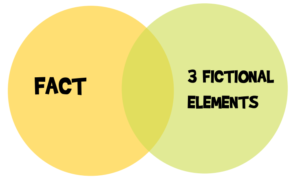
Try turning it around and take three facts from your life and mix it with one fictional element for more fun story ideas.
Writing prompts
Good old writing prompts, they never let you down. Writing prompts are normally pre-written story ideas or sentences that can be used to help you write a story when your mind is completely blank. Of course, when using writing prompts you don’t have to religiously stick to what the writing prompt is saying. You can break outside of the lines and start writing something completely different if you like! Remember writing prompts are only there to get rid of blank page syndrome. Once you are cured of this, then its time to break free and follow your own imagination to new places!
P.S. Story starters are another tool some writers use to get their imagination up and running.
Have you ever tried mixing up writing prompts to create a mega-story? No, we haven’t, but it sounds super fun!
Image Prompts
They say an image is worth a thousand words. And they ain’t lying! An image really is worth a thousand words and even more! Have you ever stared at an old photograph or picture in a newspaper and thought, “I wonder what’s going on over there?” or “I wonder who is that lady?”. Yep, that’s the magical moment where ideas come from. An image is never as what it appears to be. Always remember that there is a background story to everything and this story could be your winning idea. Your job is to look at image prompts with curiosity, ask yourself a million questions and write the answers down on a piece of paper. Somewhere in these will lie your brilliant story idea.
Family moment alert! Why not ask a member of your family to get the old family photo album out and let them tell you their version of the stories linked to each photograph.
Random words
The power of words is truly remarkable! One word could mean so much, like the word ‘sorry’ or even the word ‘love’. In fact, a person could write a whole story based on the word ‘sorry’ alone, as it could remind them of a time they had to apologise leading to a time when they felt hurt and so on. These are all elements of a good story idea. And all you need is a dictionary! If you don’t own a dictionary, you can out this online dictionary with the “random” word feature built-in to inspire you:
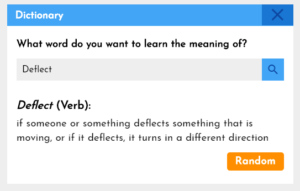
If you’re doing this the old-fashioned way with a physical copy of a dictionary in hand, then here’s how to use this technique for idea generation:
- Open your dictionary on a random page
- Close your eyes
- With eyes closed point to a random word
- Use this word as the focus of your next story idea
- Repeat process if the word is too boring
Magazines and newspapers
This might seem a little dated in today modern world. But when it comes to winning story ideas, nothing beats a shocking newspaper headline or an inspiring magazine story. Bringing this technique to the modern world, we recently saw the following headline on the CBBC Newsround website:

This news headline relates to the Women’s World Cup 2019 which is currently happening. Just by looking at this headline alone, you can be inspired to write a story about a team of young female footballers (or soccer player for the Americans) winning against the odds. You can even focus on an individual football player’s life and so on. Newspaper headlines, in particular, bring important issues to light and make the perfect base for an inspirational story that really could change the lives of others.
Watch the news regularly to find some interesting ideas for your stories.
TV shows
Everyone watches TV. In fact, the average person probably spends at least 4 hours or more a day watching television programs. If you’re an avid TV watcher, maybe it’s about time you put all those hours of TV watching to use. In fact, why don’t you think about a show you love watching right now. Then write a list of 10 things you love about that show. When you’re done, read through your list and see if you can use any of these ideas in your next story! We’re not asking you to copy the exact storyline of the TV show, but to use interesting pieces of it to include in your own story, along with other ideas you may have.
Why not become a TV critic and criticise your favourite TV show. The write your own better version of that TV show.
Listen to some music
Music is a great way to wind back and relax on a Sunday afternoon. It also has the power to bring back old memories and feelings, especially when you listen to an old favourite. In fact, artists have always found inspiration in music for their artwork. So a writer should be able to find inspiration in music too! Give it a go now and see what amazing story ideas come flooding into your mind. Oh and don’t forget to keep your ideas journal handy to note down these amazing ideas!
Why not take a piece of your favourite song’s lyrics and use this as the focus of your next story idea?
Old Drawings
Remember those old drawings of stick men and wobbly monsters you did years ago. Maybe they were works of art or maybe you just hid them somewhere so no-one will ever see them. Either way, it’s time you got them out and used them as a source of inspiration. A child’s imagination is a wonderful thing. Sadly the older we get, this wacky sense of imagination seems to fade away. Looking at old drawings can bring back that wacky imagination and remind you of a time when you believed in monsters, fairies and everything else that you had forgotten about. These old memories could be a treasure chest of valuable story ideas ready to be explored and written about.
Forget old drawings, why not create some new drawings and use these as a source of inspiration?
Doodle around
Doodling on a piece of paper is a great relaxation technique. It’s also a great way to come up with story ideas! You don’t have to be an artist to doodle something, you just need to be bored and have a paper and pen in hand. In fact, you can create a space in your ideas journal just for doodling random stuff. As doodling helps relax your mind, it can make room for your mind to focus on other things like super cool story ideas. To help your mind relax, you can doodle anything you like, such as patterns, flowers, cars, circles, squiggly lines etc. As long as you are not trying too hard and you can feel yourself getting more calm through doodling.
You might want to see this post on easy things to draw to help you improve your ‘doodling’ abilities!
Speak to a family member
When all is lost, it’s time to ask for help. You don’t literally need to go up to a family member and ask them for a good story idea. You can simply just ask them questions about their day or week or even about how they grew up or what they did as a child. All these questions can help you feel inspired to write a brilliant story even if it’s not about your life! When writing your story make sure you ask their permission if you want to use real-life names or to keep things simple just use made-up names in your story.
Older relatives are normally the best to ask about family history and for old inspiring tales of your parents origins.
Go to sleep
Some of your best ideas come at night. So it makes sense that going to bed early can inspire a brilliant story idea. It is true that most of the times when you wake up you don’t remember your dreams. But there are rare times when you do remember, especially right after you wake up. So, here comes your ideas journal to the rescue again! At night keep your ideas journal next to your bed. So the very moment you have that big idea, you can jot it down straight away. And believe us, dream catchers do not work – so it’s important to keep an ideas journal to remember your dreams!
Remember nightmares are not real! They are actually your insecurities coming out in dream form, so don’t be scared of them. Instead use them as inspiration for your next story.
Read a book
You can’t be a writer without being a reader. And when it comes to coming up with ideas for stories, nothing beats reading the work of others. So find a nice spot, pick up your favourite book and start reading away. Once you have finished, take a moment to reflect on the book you just read and ask yourself:
- Which parts of the book did I like?
- What parts were boring?
- How could the author have made the book better?
Answering the above questions will give rise to possible ideas for stories you might want to write.
It may also be a good idea to write your very own book review of any books you read, so you have notes on the good and bad points of that book.
Remember history
Have you ever looked through a history textbook or a documentary on TV and wondered what life would’ve been like years ago. Well… now’s your chance to find out! No, we don’t have a time machine for you, but we do have a couple of ideas to help you. One way you can use history to generate story ideas is to first pick a time period of your choice. This could the 19th Century, the caveman times, medieval times or whatever you like. Then comes the research. Go to your local library, ask a history teacher or research online about how people lived in that time period. Make as many notes as you can on how they dressed, what did they eat, what sports did they play, how did they communicate and so on. Use your notes to come up with a historic idea, such as a biography on someone’s life or a day in the life story and so on.
Random objects
This one is quite similar to the random words technique, but instead of words, you use random objects around your room or house. We’re sure everyone has seen Disney movies, like Beauty and the Beast where inanimate objects like teapots and teacups can talk. This technique is very similar to that. First, you pick any object you like and next you try to imagine what it would be like if that object could speak. For example, if you choose your alarm clock, you can try to imagine what that alarm clock would say to you if it could talk. It might be annoyed about waking humans up every morning or it might be upset about being replaced by your mobile phone and so on. This is a great technique for coming up with funny and wacky story ideas that are sure to be unique.
Your interests
Writing should never be a chore. It is a skill used by almost everyone in their daily lives. Most of the time we don’t even realise it, but we’re doing some form of writing such as creating Facebook posts, sending a message to a friend or making notes in class. So you see everyone writes! But the thing is when it comes to writing stories some people can get bored when they can’t come up with a good enough idea. A technique we suggest here is to just focus on your interests and what you enjoy doing in general. If you’re a basketball fan, then write about it. If you love to cook, then write about food. If you love dancing, write a story about dancing. The point is you can write a story about anything you like. There are no rules out there saying you can’t write about a certain topic.
Observe others
A technique recommended by many writers is to observe others. This doesn’t mean that you sit there staring at people or being nosy by listening very closely to their conversations. It simply means, when you are out and about, such as sitting on a bus you are aware of your surroundings. You can quickly glance over at people to see what they are doing or you might overhear something interesting that a person is talking. These are all sources of inspiration for your next big story idea. And it’s not just people, sometimes animals are doing strange stuff too!
When observing others, you might want to combine this technique with the five sense technique to fully describe the situation.
Video Writing Prompts
Video writing prompts are a great way to inspire young writers. There’s so much to see, hear and so many questions to ask when watching a short video. While writing prompts can be good for story-telling, they can be quite limiting to the imagination. With video prompts you can see the action and characters right in front of you, so thinking of how a character might look or even scene isn’t too difficult. Subscribe to our YouTube channel for free weekly video prompts for kids.
Set yourself goals
Our final technique for coming up with ideas is setting goals. Goals are a great way to motivate you to keep writing every day. Goals can also provide you with much-needed motivation for when it comes to generating awesome ideas. For example, you can set yourself a goal of doing 15 minutes of freestyle writing every day or to go to the park and write down at least 5 observations using the five senses technique. These goals can help you come up with great story ideas in no time!
There you have it! More than 20 techniques on how to come up with story ideas and how you can use them. Remember when it comes to story ideas, your idea doesn’t need to be complex with tons of twists and turns. In fact, one of the best selling children’s books of all time is a story about a very hungry caterpillar (The Very Hungry Caterpillar by Eric Carle). Which is a story about one very hungry little caterpillar that turns into a butterfly! So you see coming up with a good story idea doesn’t always have to be a difficult task in your story writing journey.
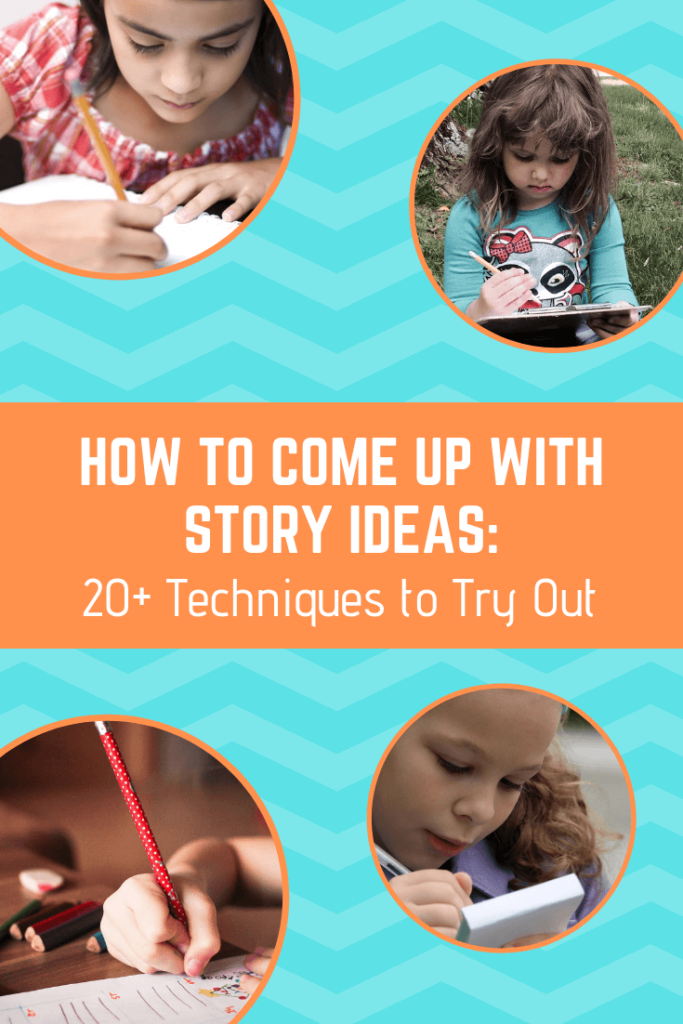

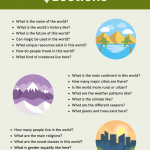

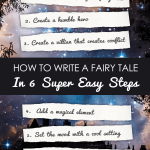
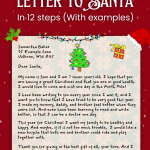
Comments loading...